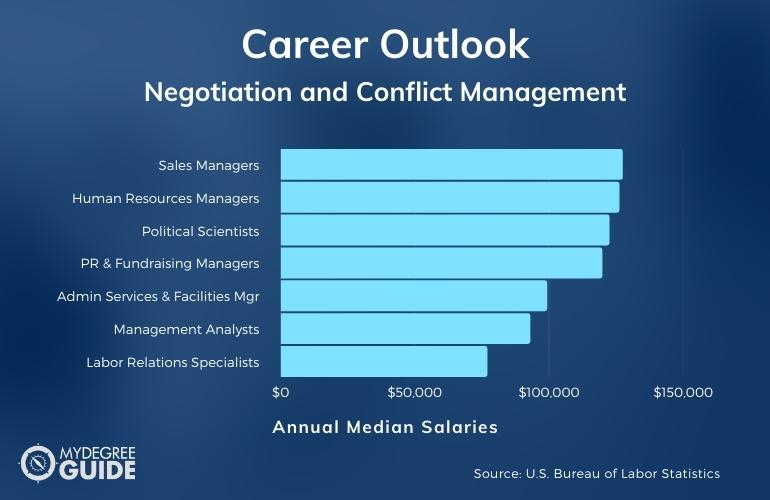If you often find yourself helping friends, family, and coworkers resolve their disputes, a masters in negotiation may be a strategic academic path to pursue.

Students who complete an advanced degree in negotiation or dispute resolution learn about the theories and applications of conflict, communication, and leadership. These skills are necessary to reduce tension and help opposing parties find common ground.
Editorial Listing ShortCode:
Completing an online master’s in conflict resolution may help prepare you for a rewarding career that allows you to capitalize on your existing interest in negotiation and mediation. You can begin by learning about online management degree programs and determining which ones best meet your needs.
Online Masters in Negotiation & Conflict Resolution Programs

Conflicts arise in organizations of every kind. As a result, a master’s in negotiation is useful in a number of different work environments. After graduating, you may find yourself applying for positions in business, healthcare, education, finance, or government.
Within these institutions, graduates often become arbitrators, managers, mediators, conciliators, or analysts. These roles provide guidance and support to help settle conflicts peacefully and reach the best possible outcomes for all parties.
Editorial Listing ShortCode:
A master in conflict resolution program may be a good fit if you are interested in human behavior and interactions, the root cause of conflicts, and effective ways of communicating. Conflict resolution degree programs are typically multidisciplinary, meaning that they draw from many different areas of study. During a dispute resolution masters program, you will most likely learn about topics including:
- Conflict analysis
- Economics
- International relations
- Sociology
- Political science
- Communication
You may also learn about issues like ethics, human rights, and social responsibility. Additionally, working as a mediator often requires the ability to navigate cultural differences that can create friction, so it is common for master’s students in negotiation to learn about multiculturalism.
Depending on which school and program you attend, you may be able to focus your degree on a specialization that more specifically applies to your career goals. There will also likely be opportunities to network with alumni and connect with potential employers.
Some programs also involve internships, which provide an excellent opportunity to get hands-on experience in the field before you graduate. Others require capstone projects, which allow you to study a particular area of conflict resolution in great depth.
Negotiation and Conflict Management Careers & Salaries

Conflicts arise between governments, corporations, and individuals, so career opportunities for experts in conflict management abound. With a master’s degree in negotiation and dispute resolution, you may be well-positioned to take on one of many roles in this sector.
According to the Bureau of Labor Statistics, these are some of the common positions for graduates of conflict resolution masters programs.
| Careers | Annual Median Salaries |
| Sales Managers | $127,490 |
| Human Resources Managers | $126,230 |
| Political Scientists | $122,510 |
| Public Relations and Fundraising Managers | $119,860 |
| Administrative Services and Facilities Managers | $99,290 |
| Management Analysts | $93,000 |
| Labor Relations Specialists | $77,010 |
| Human Resources Specialists | $62,290 |
| Paralegals and Legal Assistants | $56,230 |
| Arbitrators, Mediators, and Conciliators | $49,410 |
The salary for an employee in conflict resolution differs greatly depending on the location and type of employer, but they often pay higher than average salaries. The type of role you can qualify for could also depend on your prior education or experience.
Editorial Listing ShortCode:
Jobs in this field are generally in high demand, with steady or above average growth anticipated over the next several years. According to the Bureau of Labor Statistics, some of the most rapidly expanding positions include operations research analysts (23% job growth) and management analysts (11%).
Master of Negotiation Curriculum & Courses

The curriculum of your masters in dispute resolution will be specific to the university that you choose and whether you are focusing on a particular area of the field. In general, these are some of the courses that you are likely to encounter:
- Conflict Theory: As a core requirement for most negotiation programs, this class focuses on the different theoretical interpretations of conflict.
- Negotiation and Mediation: This is typically a foundational course that introduces students to essential practices to resolve disputes.
- Managing Workplace Conflict: In this course, you’ll learn about conflict resolution within the workplace from the perspective of human resources employees and leadership.
- Law and Conflict Resolution: The central topic of this course is the integral nature of conflict resolution in systems of law and justice.
- Arbitration: In this course, you’ll learn about the legal process of arbitration.
- Intrapersonal Dynamics and Conflict: In this class, you’ll gain a greater understanding of how temperament, personality, and communication styles affect human relationships and interactions.
- Networking and Sustainability: This course focuses on networks at the local, national, and global level and the role they play in group conflicts.
- Applying Conflict Analysis: You can build on your foundational knowledge and explore how you can apply conflict resolution strategies to real-world scenarios.
- International Justice and Human Rights: In this class, you’ll examine human rights issues and advocacy from multiple perspectives, including moral and legal viewpoints.
- Leadership and Organizations: In this course, you’ll learn about possible leadership styles and their connection to social justice and change.
If you choose a masters program that is focused on a particular area of conflict resolution, such as international relations or human resources, you’ll often complete more specialized courses in those areas.
How to Choose an Online Masters in Negotiation Program

As you consider different universities for your masters in negotiation, it may be helpful to analyze some key points.
- Cost. It’s helpful to compare the fees of different programs as well as the overall tuition costs of different schools.
- Accreditation. Attending an accredited program, or at the very least an accredited school, is highly beneficial.
- Format. Some programs operate on a synchronous schedule and require you to attend classes at specific times, while others are asynchronous, allowing you to work at the time that fits around your other obligations.
- Services. You may want to explore available student support programs, including tutoring, advising, and career guidance.
- Curriculum. It is also strategic to compare required coursework through different programs so you can determine which ones best suit your interests and goals.
- Financial Aid. You may want to determine what aid options you might apply to your tuition costs for each program. You can also see whether an institution offers any scholarship opportunities.
There are likely many online masters programs available that could prepare you for a future career, such as an online masters in compliance or in negotiation, so finding the right one may require some research and self-reflection. If possible, speaking to faculty members or alumni could serve as another source of insight.
Admissions Requirements

Every school has a specific set of admissions criteria, but these are some of the requirements that appear most frequently:
- Transcripts. You’ll send official transcripts indicating that you completed your bachelors.
- CV. You might submit a resume that reflects your professional, academic, and extracurricular accomplishments.
- Letters of recommendation. You can ask former instructors or supervisors to write letters describing your strengths and abilities.
- Essay or personal statement. You can discuss your goals and why you’re interested in enrolling in the program.
- Test scores. Some schools may require a minimum GRE score, though not always required.
Students who are not native English speakers may also need to submit TOEFL scores.
Accreditation

Accreditation status may not be the first things students consider when evaluating a degree program, but it’s an important characteristic of any academic institution.
Colleges and universities can apply for regional accreditation, which is the most recognized accreditation status. In order to receive accreditation, schools must pass a rigorous assessment process that determines whether it meets a set of predetermined standards.
Editorial Listing ShortCode:
The metrics that regional accrediting bodies use to assess higher education institutions are typically stricter, ensuring a higher level of academic quality. It is also usually easier to transfer credits from regionally accredited schools.
Negotiation Licensure and Certifications

In addition to a master’s degree, some students decide to seek certification or licensure to further strengthen their skills and qualifications for potential jobs. For instance, holding a certification offers demonstrable proof that you are experienced and knowledgeable as a mediator. Common mediator certifications include:
- National Association of Certified Mediators Certification
- International Mediation Institute Certification
- com – Certified Mediator
In addition to enhancing your knowledge and problem-solving abilities, industry certification may also be required for liability insurance. Becoming certified by an international organization like IMI might increase your credibility and improve your marketing strategy. Certification programs are generally separate from master’s degrees and require an additional financial investment.
Financial Aid and Scholarships

The high cost of a degree program can be a deterrent to many students, but there are financial aid options that can help offset the expense.
You can apply for federal aid by submitting a FAFSA form. You may also be able to find state aid programs that can further reduce your out-of-pocket cost. If you are already working in the field, your employer may be willing to offer tuition reimbursement or assistance as part of your professional development. It could also be worthwhile to research scholarships that are created for your discipline and circumstances.
Negotiations & Conflict Management Professional Organizations
Membership in a professional organization could enable you to network and strengthen your resume. Here are some negotiations and conflict management professional organizations:
- Association for Conflict Resolution (ACR): The ACR has regional chapters, committees, and conferences that offer the opportunity to connect with colleagues.
- International Association for Conflict Management (IACM): Membership in the IACM includes a journal subscription, discounted conference registration, and exclusive resources.
- International Ombuds Association (IOA): The IOA is a global organization that supports professional ombuds with access to virtual conferences, training, and courses.
To join one of these organizations, you may be required to demonstrate that you are a working professional and pay an annual membership fee.
What Can You Do with a Master’s in Negotiation?

Graduates from masters in conflict resolution programs can pursue many different career options that involve mediation, negotiation, and analysis. These roles involve helping settle disputes between parties, improving public policy, and creating mutually beneficial contracts.
Mediation is an important aspect within government, law, education, and the corporate world, which broadens the pool of potential employers. According to the Bureau of Labor Statistics, many of these positions also pay higher than average salaries.
Editorial Listing ShortCode:
With a master’s in negotiation, you may be well-qualified for jobs like professional arbitration, mediation, human resources management, or operations analysis. Some graduates of this masters program continue their educations and enter doctoral programs in risk management or negotiation.
How Long Does It Take to Get a Master in Negotiation Online?

The amount of time that you will need to spend completing an online master’s in negotiation varies from program to program. Most require students to complete 30 credits to 48 credits, which can typically be completed within 1 to 2 years with full-time, year-round study.
If you are only able to attend part-time, or if there is a thesis, internship, or practicum requirement, it may take longer to graduate. On the other hand, if you are not currently working, you may be able to enroll in a condensed program and finish more quickly.
Is a Masters in Negotiation Worth It?

Yes, a masters in negotiation is worth it for many students. Resolving disputes is essential for businesses, governments, schools, and economies to function. This means that professionals with expertise in conflict resolution programs will likely remain in high demand.
According to the Bureau of Labor Statistics, employment for arbitrators, mediators, and conciliators is expected to grow 6% over the next ten years. Many positions in this field are expected to grow at an above average rate over the same period. This includes operations research analysts (23% job growth) and human resources specialists (8%).
Editorial Listing ShortCode:
The skills developed while completing a masters in negotiation may help prepare you for a rewarding career in mediation, arbitration, or analysis.
Universities Offering Online Masters in Negotiation Degree Programs
Methodology: The following school list is in alphabetical order. To be included, a college or university must be regionally accredited and offer degree programs online or in a hybrid format.

Abilene Christian University offers an online program for an MA in Conflict Management and Resolution. This fully online program requires the completion of 36 credit hours of coursework and can potentially be completed in 2 years. The program offers four concentrations: General, Practitioner, Organizational, and Healthcare Organizations. ACU provides a Christ-centered community.
Abilene Christian University is accredited by the Southern Association of Colleges and Schools Commission on Colleges.

Bay Path University offers an MS in Leadership and Negotiation. The program emphasizes soft skills, such as interpersonal communication and emotional intelligence. It requires the completion of 36 credits and is 100% online. Prospective students can apply throughout the year to start in either February or October.
Bay Path University is accredited by the New England Commission of Higher Education.

Brenau University’s MBA in Mediation and Conflict Resolution can be earned through online or evening classes. The program requires the completion of 42 semester hours. It focuses on conflict management skills as they apply in business. The curriculum consists of courses such as International and Cross-Cultural Conflict Resolution, Mediation Theory and Practice, Negotiation, and Organizational Conflict.
Brenau University is accredited by the Southern Association of Colleges and Schools Commission on Colleges.

California State University—Dominguez Hills offers an online program for a Master of Arts in Negotiation, Conflict Resolution, and Peacebuilding. Courses are asynchronous, and each one is 12 weeks long. To graduate, students must complete a total of 36 semester units over two years and have the option of completing either a thesis or a portfolio.
CSU Dominguez Hills is accredited by the Western Association of Schools and Colleges.

Columbia University offers a Master of Science in Negotiation and Conflict Resolution. The degree can be earned through part-time attendance in on-campus or hybrid formats. New students may begin in the fall or spring. The program can typically be completed in 6 to 7 terms. It is designed to be appropriate for both early- and mid-career professionals.
Columbia University is accredited by the Middle States Commission on Higher Education.

Creighton University offers a Master of Science in Negotiation and Conflict Resolution. The program is flexible and allows students to study according to their own schedules. It provides opportunities for students to be part of a community and to network with others. Full-time students can potentially finish in 16 months.
Creighton University is accredited by the Higher Learning Commission.

George Mason University’s MS in Conflict Analysis and Resolution can be earned mostly online. All coursework is online, but students are required to attend a week-long residency on campus. Students may complete either a thesis or an internship for elective credit. The curriculum consists of courses such as Foundations of Conflict Analysis and Resolution, Conflict Inquiry, and Facilitation Skills.
George Mason University is accredited by the Southern Association of Colleges and Schools Commission on Colleges.

Pennsylvania Western University offers a 100% online program for a Master of Arts in Conflict Resolution. The program teaches both theory and applied skills, and students can choose between completing either an internship or an applied research project. The curriculum consists of courses such as Special Topics in Conflict Resolution, Restorative Justice and Victim Offender Mediation, and Legal Aspects of Conflict Resolution.
Pennsylvania Western University is accredited by the Middle States Commission on Higher Education.

The University of Baltimore offers an MS in Negotiations and Conflict Management. Classes are available entirely online or in person during the evenings or on weekends. The degree requires the completion of 36 credits. The curriculum consists of courses such as Understanding and Assessing Conflict, Research Methods, and Ethnic and Cultural Factors in Conflict.
UB is accredited by the Middle States Commission on Higher Education.

The University of North Carolina—Wilmington offers a Master of Arts in Conflict Management and Resolution. Courses are available in both a traditional, on-campus format and in an asynchronous, online format. Students may enroll either full-time or part-time. The program can typically be completed in 2 years of full-time study.
The University of North Carolina Wilmington is accredited by the Southern Association of Colleges and Schools Commission on Colleges.
Getting Your Masters in Negotiation Online

A career in negotiation may be appealing to students who excel in helping their coworkers or loved ones put an end to their conflicts. Completing a master’s in conflict resolution is a strategic step toward building a fulfilling career that applies these skills.
If you are interested in enrolling in a negotiation master’s program, you can begin by researching reputable online programs from accredited schools. It’s helpful to consider the cost, curriculum, and benefits of a program before making your final decision.
The sooner you start exploring online negotiation masters programs, the sooner you may advance your professional qualifications in this growing field.

